The world doesn’t know yet what caused the dramatic power outage on the Iberian Peninsula (BBC, 4/28/25). Nevertheless, the right-wing press both in the US and Britain quickly exploited it to dubiously suggest that the blame rested with Spain’s push for more renewable energy sources. The insinuation that clean energy is at fault has even infected outlets like the New York Times and AP.
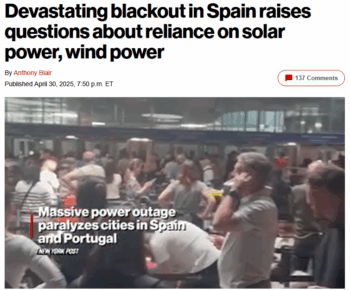
New York Post (4/30/25): “Experts have previously warned that Europe’s increasing reliance on renewable energy…could lead to blackouts and other supply issues.”
The right-wing New York Post (4/30/25), while admitting that a final determination on the cause of the outage in Spain hadn’t surfaced, ran with the headline “Devastating Blackout in Spain Raises Questions About Reliance on Solar Power, Wind Power.” As the Rupert Murdoch–owned tabloid criticized the Spanish government’s response, it reminded its readers that that government is “socialist.” It cited “experts” four times to pin blame on “renewables,” while naming only one. That expert noted that solar plants’ lack of inertia—which, the Post explained, is something produced by “gas and nuclear power plants,” means that “imbalances must be corrected more quickly.” (Inertia is not a characteristic unique to non-renewable energy, as the Post suggests; hydroelectric energy, another popular renewable, uses turbines and produces inertia.)
An op-ed by anti-environmentalists Gabriel Calzada and Fernández Ordóñez in Murdoch’s Wall Street Journal (4/30/25) said that “Spain’s system was engineered politically, not rationally.” They blamed “energy-transitionist ideologues” on the continent for the blackout, because they “forced in” renewables.
Again, while admitting that the cause of the outrage had yet to be determined, they echoed the Post’s suggestion that renewable sources are by their nature “unreliable,” focusing on their lack of “inertia”:
The greater the share of renewables vis-à-vis conventional power plants with synchronous turbines, the less inertia there is to cushion instantaneous load fluctuations in the grid.
This causes the whole system to become “increasingly fragile, with higher risk of failure.”
The far-right journal Compact (4/29/25) said renewable “sources, especially photovoltaic solar, can’t supply the requisite inertia the grid needs.” Admitting that the cause of the outrage was still unknown, it hoped the affair would repopularize climate-ravaging forms of power generation against woke wind farms and soyboy solar plants:
Whatever the cause, this blackout could have a salutary impact on European energy policy if it dissuades countries from pursuing aggressive renewable energy policies that make power less reliable.
The importance of inertia
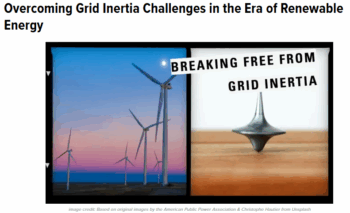
Energy Central (8/14/24): “While transitioning to a renewable-based power grid presents challenges, the benefits significantly surpass the risks.”
The loss of power for Spain and Portugal, a major crisis reminiscent of the great northeast American blackout of the summer of 2003 (WABC, 8/14/23), has taught the world an important lesson about centrality of inertia in the electricity systems built around traditional energy sources. Gas, nuclear and hydroelectric plants use giant spinning turbines that “store kinetic energy, which helps stabilize the grid by balancing supply and demand fluctuations,” explained Energy Central (8/14/24). “High inertia means the system can better withstand sudden disturbances, such as a generator tripping or a sudden surge in demand.”
Solar and wind energy, which are in growing use in Iberia and seen as a clean alternative in an age of climate crisis, lack this feature, which means integrating them into energy grids requires alternative ways of addressing energy fluctuation problems. It’s something engineers have long understood, and have been addressing with a variety of technical solutions (Green Tech Media, 8/7/20; IET Renewable Power Generation, 11/10/20).
In general, questions of inertia are an important concern of energy planners when it comes to balancing clean energy and the need to stabilize the grid. But they’re not the only way the grid is stabilized.
A Spanish professor of electrical engineering explained in Wired (5/1/25) that both local “meshes,” which help distribute electrical flows, and interconnections with neighboring grids are crucial for preventing the kind of imbalance that apparently led to the Iberian blackout. But the latter has always been Spain’s “weak point,” because of the “geographical barrier of the Pyrenees” mountains. Rather than suggest a pullback from solar or wind, as right-wing media seem to pine for, experts told Wired the needed response was greater interconnection, and more storage mechanisms or stabilizers to account for the reduction in inertia.
‘Uniquely vulnerable to outages’
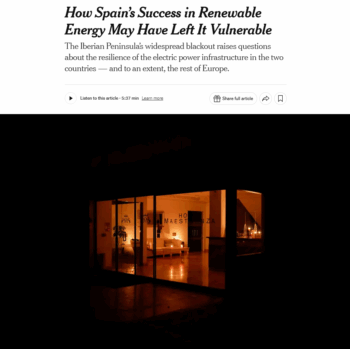
New York Times (4/29/25): “The blackout could bolster the argument for retaining conventional generation sources.”
But the anti-renewable drum beat from the right inspired similar reporting in more centrist corners. The New York Times (4/29/25) took a similar tone, under the headline, “How Spain’s Success in Renewable Energy May Have Left It Vulnerable.” The article itself seemed to have an identity crisis, trying to paint the peninsula’s success in ramping up renewables as a false victory while at the same time acknowledging that it wasn’t just the renewable energy itself that caused the vulnerability:
The incident exposed how Spain and Portugal, promoted as success stories in Europe’s renewable energy transition, are also uniquely vulnerable to outages, given their relative isolation from the rest of the continent’s energy supply.
The article did also explain Spain’s relative lack of investment in necessary grid infrastructure and storage. But those who didn’t get past the headline would have come away with the same false impression about renewables as readers of the New York Post.
The Times (4/30/25) doubled down in a follow-up piece the next day, saying, “The incident has raised questions about whether Spain and Portugal’s rapid shift to renewable energy left them more vulnerable to outages.”
An AP (4/30/25) explainer, which was also picked up by the Washington Post (4/30/25), used phrases like “renewed attention” and “questions remain” to cast a vague haze over the role of the peninsula’s renewable energy:
On Tuesday, there was renewed attention on Spain’s renewable energy generation. The southern European nation is a leader in solar and wind power generation, with more than half of its energy last year having come from renewable sources. Portugal also generates a majority of its energy from renewable sources.
Questions remain about whether Spain’s heavy renewable energy supply may have made its grid system more susceptible to the type of outage that took place Monday. The thinking goes that nonrenewable energy sources, such as coal and natural gas, can better weather the type of fluctuations observed Monday on Spain’s grid.
After sowing doubt about renewables, the AP wrote that Eamonn Lannoye, managing director at the Electric Power Research Institute, said “it was too early to draw a straight line between Monday’s event and Spain’s solar power generation.”
‘You’ve got to get the engineering right’
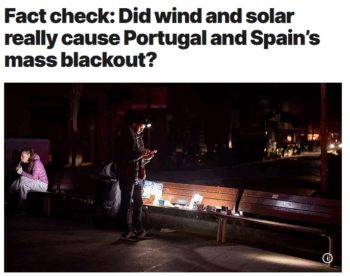
Euro News (4/29/25): “Far from being the cause of the peninsula’s woes…the large percentage of renewable energy in Spain and the flexibility of hydropower systems enabled the nation to react and recover more quickly.”
Though none of the outlets above seemed able to find them, some experts suggested neither solar power nor inertia were likely at fault. Euronews (4/29/25) said:
Some experts have previously voiced concern that Spain’s grid needs to be upgraded to cope with the rapid integration of solar and wind. But others stress the unlikelihood of the mass blackout being down to the intermittent renewables, which the Spanish and Portuguese operators are by now adept at handling.
Spanish energy think tank Fundacion Renovables explains that renewable power plants with 2MW of power generation or more were disconnected because of a disturbance in the frequency of the power grid—as per national safety protocols.
Essentially, the disturbance was “a consequence and not a cause,” it said in a statement. SolarPower Europe, UNEF and Global Solar Council also emphasise that photovoltaic power plants did not voluntarily disconnect; they were disconnected from the grid.
The English edition of the Spanish daily El País (5/1/25) concurred, quoting Pedro Fresco, general director of the Valencia Energy Sector Association:
The failure of a photovoltaic plant, however large, doesn’t seem likely to be the cause of the collapse of the entire electricity system…. Nor is it true that there weren’t enough synchronous sources at that time: There was nuclear, a lot of hydropower, some solar thermal and combined cycle power, and even cogeneration, coal and renewable waste… In fact, there was more synchronous power than at other times.
Others pointed more to the grid itself. Reuters’ energy columnist Ron Bousso (4/30/25) said the “issue appears to be the management [emphasis added] of renewables in the modern grid.” The outage, he said, “should be a stark warning to governments: Investments in power storage and grid upgrades must go hand in hand with the expansion of renewables generation.”
The Guardian (4/29/25) also intervened, quoting a European energy analyst: “The nature and scale of the outage makes it unlikely that the volume of renewables was the cause.” Further, the paper quoted University of Strathclyde electrical engineer Keith Bell:
Events of this scale have happened in many places around the world over the years, in power systems using fossil fuels, nuclear, hydro or variable renewables. It doesn’t matter where you are getting the energy from: You’ve got to get the engineering right in order to ensure resilient supplies of electricity.
Experts say it could take months to determine the exact cause(s) of the outage (New York Times, 4/29/25).
Exploiting the crisis
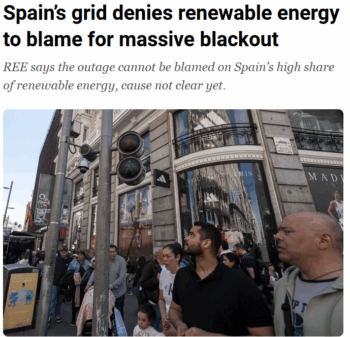
Spanish power company chief Beatriz Corredor (Al Jazeera, 4/30/25): ““These technologies are already stable, and they have systems that allow them to operate as a conventional generation system without any safety issues.”
The quickness of not only right-wing but also centrist outlets to blame solar and wind power for the debacle is in part rooted in Spain’s right-wing political opposition’s exploitation of the crisis, using it to bash the left-leaning governing parties and Red Eléctrica de España (REE), the nation’s energy company. Al Jazeera (4/30/25) quoted a spokesperson for the right-wing People’s Party:
Since REE has ruled out the possibility of a cyberattack, we can only point to the malfunctioning of REE, which has state investment and therefore its leaders are appointed by the government.
It’s easy to see why the People’s Party would politicize this. Just last year, the party fell under heavy criticism in Valencia, where the party is in local power, for its failure to act in the face of dire weather reports that led to massive flooding, killing more than 200 people (AP, 11/9/24). The national blackout has allowed the right to attempt to shift the anger toward the ruling Socialist Workers Party.
But it’s also par for the course for the right-wing media to defend the conservative alliance with the fossil fuel industry, which is threatened by any move to address the climate crisis. The media’s jump to blame Spain’s renewables for a massive blackout looks a whole lot like their eagerness to (falsely) blame wind power for Texas’s 2021 blackouts (Media Matters, 2/19/21; FAIR.org, 2/26/21).
While we may eventually know exactly what happened—likely to be a complicated mechanical explanation that should inform us how to better guard against future problems—propagandists know that one should never let a good crisis go to waste.
This post was originally published on FAIR.